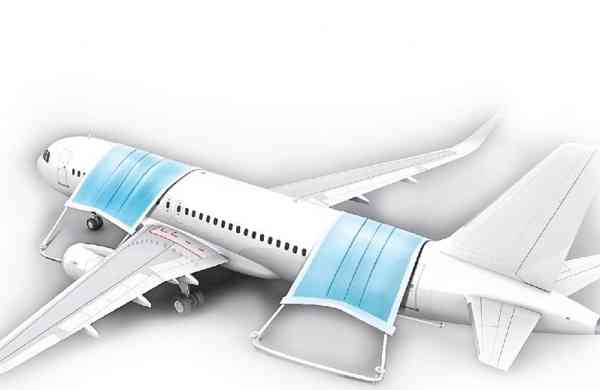Jet fuel price cut 23%; costs less than one-third of petrol, diesel
ATF, which is utilized as a fuel in planes, presently costs short of what 33% of the cost of petroleum utilized in vehicles and bikes. A liter of petroleum in Delhi seeks Rs 69.59 while fly fuel is estimated at Rs 22.54 per liter
twitter-logo PTI Last Updated: May 3, 2020 | 11:36 IST

Stream fuel value cut 23%; costs short of what 33% of petroleum, diesel
Since February, fly fuel costs have been cut by just about 66%. ATF cost in Delhi before the decrease cycle started in February was Rs 64,323.76 per kl and now costs Rs 22,544.75 per kl
MORE FROM THE AUTHOR
Coronavirus lockdown: Remove limitations on ramble use for fundamental enterprises, govt organizations, says FICCIAnti-China melody: There will be trip of capital from neighboring nation, says Ram Madhav
Fly fuel (ATF) costs have been cut by a lofty 23 percent in accordance with a droop in global oil costs and it currently costs around 33% of petroleum and diesel whose rates keep on being solidified for the 50th day on Sunday.Aviation turbine fuel (ATF) cost has been cut by Rs 6,812.62 per kilolitre, or 23.2 percent, to Rs 22,544.75 per kl in the national capital, as indicated by a value notice by state-claimed oil showcasing organizations.
ATF, which is utilized as a fuel in planes, presently costs short of what 33% of the cost of petroleum utilized in vehicles and bikes. A liter of petroleum in Delhi desires Rs 69.59 while fly fuel is evaluated at Rs 22.54 per liter.
Diesel, utilized for the most part in trucks, transports and tractors, is estimated at Rs 62.29 per liter.
Truth be told, even market estimated or non-financed lamp oil is a lot less expensive than petroleum and diesel after its rates were sliced 13.3 percent to Rs 39,678.47 per kl (Rs 39.67 per liter), as per the warning.
This the steepest cut ever and 6th decrease in ATF costs since February.
Since February, fly fuel costs have been cut by just about 66%. ATF cost in Delhi before the decrease cycle started in February was Rs 64,323.76 per kl and now costs Rs 22,544.75 per kl.
Comparative decrease has been affected in other metro urban communities too.
While the oil PSUs have routinely changed ATF costs, they have since March 16 kept petroleum and diesel costs on hold apparently because of extraordinary instability in the universal oil markets.
Petroleum and diesel costs were solidified not long after the legislature raised extract obligation on the two powers by Rs 3 for every liter each to wipe up gains emerging from falling worldwide rates.
Oil organizations, rather than giving the extract climb to buyers, chose to modify them against the decrease required in light of the drop in global oil costs. They utilized a similar apparatus and didn’t pass on the Re 1 for every liter climb required for exchanging over to ultra-clean BS-VI grade fuel from April 1.
Market examiners, be that as it may, said a similar unpredictability was seen in ATF costs too however that has not halted the oil organizations from giving the slice to carriers.
All the more significantly, no aircraft has been working since mid-March taking into account limitations set to check the spread of coronavirus, yet oil organizations have kept on modifying descending plane fuel costs.
Truth be told, oil organizations used to reexamine ATF costs on the first of consistently however they on March 21 embraced fortnightly modifications to pass on the advantage of falling worldwide oil costs to the aircrafts.
Indeed, even non-PDS or market valued lamp oil cost has seen rate decrease like ATF. It was valued at Rs 65,815.47 per kl in January.
In spite of the fact that the legislature had deregulated petroleum and diesel costs, rate changes have been in the past required to be postponed by open part oil organizations Indian Oil Corp (IOC), Bharat Petroleum Corp Ltd (BPCL) and Hindustan Petroleum Corp Ltd (HPCL) for reasons that have all the earmarks of being non-business.
There was a 19-day value freeze on petroleum and diesel in front of the Karnataka surveys in May 2018 in spite of universal fuel costs going up by about USD 5 a barrel. Be that as it may, no sooner were the races over, they quickly gave to clients the ideal increment – more than 16-straight days post-May 14, 2018, petroleum cost moved by Rs 3.8 per liter and diesel by Rs 3.38.
So also, they had quit reconsidering fuel costs for very nearly 14 days in front of the get together races in Gujarat in December 2017.
These organizations had additionally forced a stop on petroleum and diesel costs between January 16, 2017, and April 1, 2017, when get together races in five states – Punjab, Goa, Uttarakhand, Uttar Pradesh and Manipur – were held.
During the 2019 general races, they directed the correction by not passing on the entirety of the ideal increment in rates to purchasers, industry sources said. Also, rates started to rise a day after the last period of surveying for Lok Sabha races finished.
Additionally read: Coronavirus India Live Updates: Lockdown 3.0! Most elevated 1-day bounce with 2,644 cases; IAF salutes crown legends
Additionally read:Major achievement! India conducts 1 million coronavirus tests
Additionally read:Lockdown 3.0: Armed powers state ‘Thank You’ to crown warriors; look at most recent visuals from various states



